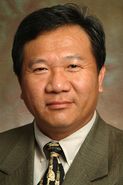Meeting
2011 ASCO Annual Meeting

Neuro-Oncology Program, Cedars-Sinai Medical Center, Los Angeles, CA
S. Phuphanich , C. J. Wheeler , J. Rudnick , M. Mazer , M. Nuno , X. Fan , J. Bender , E. S. Hawkins , K. L. Black , J. Yu
Background: Active immunotherapy offers the potential for high tumor-specific toxicity and sustained tumoricidal activity. We developed a dendritic cell (DC) immunotherapy to target specific glioma-associated antigens and induce a potent T cell response. Methods: In this study HLA-A2 or A1 positive patients were vaccinated with DC pulsed with MHC class I peptides from tumor associated antigens (TAA) expressed on gliomas. TAA epitopes included HER2, TRP-2, gp100, MAGE-1, IL13Rα2, and AIM-2. TRP-2, HER2 and AIM-2, are also overexpressed on glioblastoma multiforme (GBM) cancer stem cells. In this phase I trial, mononuclear cells isolated by leukapheresis from newly diagnosed GBM patients and differentiated into DC, were pulsed with TAA peptides, and administered intradermally three times at two week intervals. Results: 16 newly diagnosed GBM patients were enrolled since May 2007 with last follow up as of 1/28/2011. Vaccination was followed by adjuvant chemotherapy. TAA expression by qRT-PCR showed all patients expressed at least three TAA with 75% expressing all six, 87% expressing five and 94% expressing four. Correlations of increased PFS and quantitative expression of MAGE1 (p=0.03), AIM2 (p=0.003), gp100 (p=0.05) and HER2 (p=0.04) was observed. Variable changes in antigen expression were observed in the recurrent tumors. 7 of 15 tested (47%) had increased IFN gamma immune responses to a pool of the peptides. Immune responders showed a trend toward better survival. Six patients continue to show no tumor recurrence, three of whom have gone almost four years (43.5-49.8 m) and three more than 2.5 years (31.1-34.2 m). Median progression-free survival time was 16.9 months with median OS survival time not reached. At two years, the PFS rate was 43.75%; the two-year OS rate was 80.2%. Conclusions: Expression of four ICT-107 targeted antigens in the pre-vaccine tumors correlate with prolonged survival as measured by PFS and OS in newly diagnosed GBM patients. A randomized placebo controlled phase II trial is currently underway.
Disclaimer
This material on this page is ©2024 American Society of Clinical Oncology, all rights reserved. Licensing available upon request. For more information, please contact licensing@asco.org
2011 ASCO Annual Meeting
Poster Session
Central Nervous System Tumors
Central Nervous System Tumors
Central Nervous System Tumors
NCT00576641
J Clin Oncol 29: 2011 (suppl; abstr 2042)
2042
1F
Abstract Disclosures
2012 ASCO Annual Meeting
First Author: Surasak Phuphanich
2023 ASCO Annual Meeting
First Author: Daniela Annenelie Bota
2023 ASCO Annual Meeting
First Author: Ricardo L Costa
2023 ASCO Annual Meeting
First Author: Matthias Holdhoff